The Complex Systems Science Approach to Climate Change Analysis
VerifiedAdded on 2022/09/27
|11
|2120
|39
Report
AI Summary
This report delves into the application of complex systems science to the analysis of climate change. It begins by justifying the use of complex systems approaches over simpler reductionist methods, emphasizing the interconnected nature of climate change drivers and impacts. The report identifies and categorizes climate change stakeholders based on their perspectives, highlighting the diverse interests and influences at play. It then discusses the consequences of failing to recognize the complexity of climate change, including inadequate solutions and a lack of global cooperation. The report explores both hard and soft systems methodologies, evaluating their usefulness in addressing the multifaceted challenges of climate change. The hard system methodologies are applied to solve the problems and deals with known and real problems that can be solved directly. Soft methods analyze the subjective and qualitative data and interpreted the preferences and ideas of people as the actions' consequences. The report concludes by emphasizing the need for a comprehensive, systems-thinking approach to effectively mitigate and adapt to climate change. The report uses various journals, articles, and papers to support its arguments.
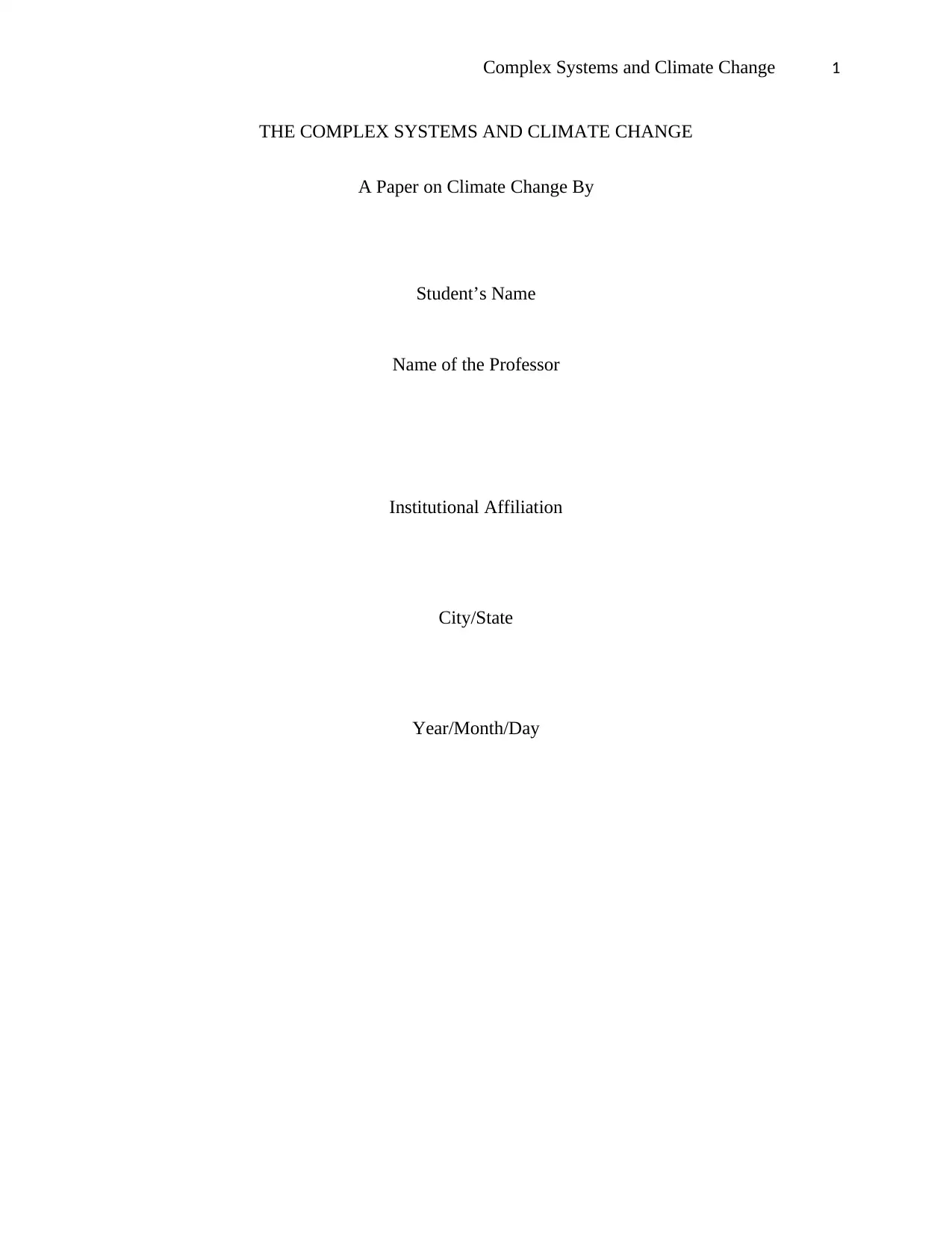
Complex Systems and Climate Change 1
THE COMPLEX SYSTEMS AND CLIMATE CHANGE
A Paper on Climate Change By
Student’s Name
Name of the Professor
Institutional Affiliation
City/State
Year/Month/Day
THE COMPLEX SYSTEMS AND CLIMATE CHANGE
A Paper on Climate Change By
Student’s Name
Name of the Professor
Institutional Affiliation
City/State
Year/Month/Day
Paraphrase This Document
Need a fresh take? Get an instant paraphrase of this document with our AI Paraphraser
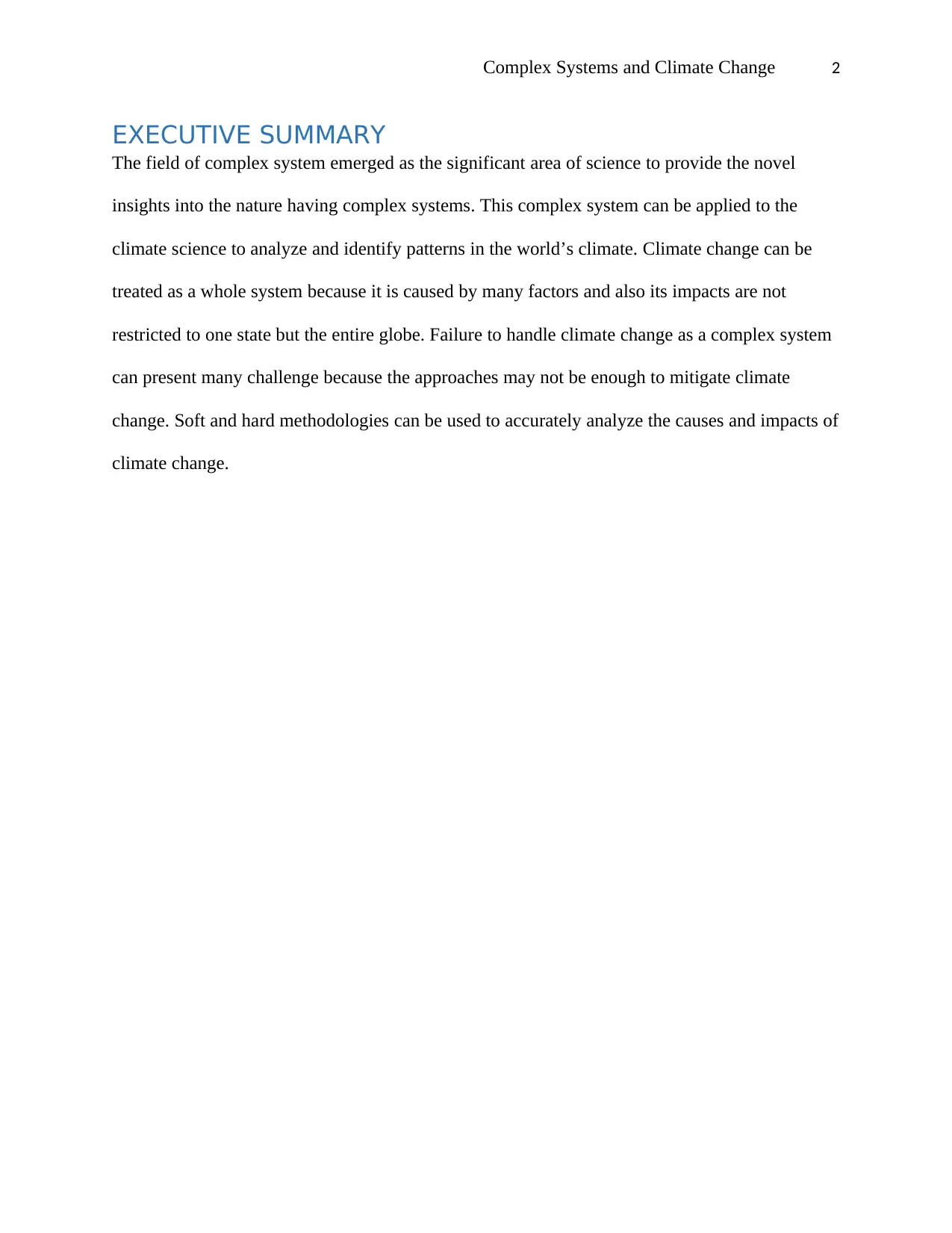
Complex Systems and Climate Change 2
EXECUTIVE SUMMARY
The field of complex system emerged as the significant area of science to provide the novel
insights into the nature having complex systems. This complex system can be applied to the
climate science to analyze and identify patterns in the world’s climate. Climate change can be
treated as a whole system because it is caused by many factors and also its impacts are not
restricted to one state but the entire globe. Failure to handle climate change as a complex system
can present many challenge because the approaches may not be enough to mitigate climate
change. Soft and hard methodologies can be used to accurately analyze the causes and impacts of
climate change.
EXECUTIVE SUMMARY
The field of complex system emerged as the significant area of science to provide the novel
insights into the nature having complex systems. This complex system can be applied to the
climate science to analyze and identify patterns in the world’s climate. Climate change can be
treated as a whole system because it is caused by many factors and also its impacts are not
restricted to one state but the entire globe. Failure to handle climate change as a complex system
can present many challenge because the approaches may not be enough to mitigate climate
change. Soft and hard methodologies can be used to accurately analyze the causes and impacts of
climate change.
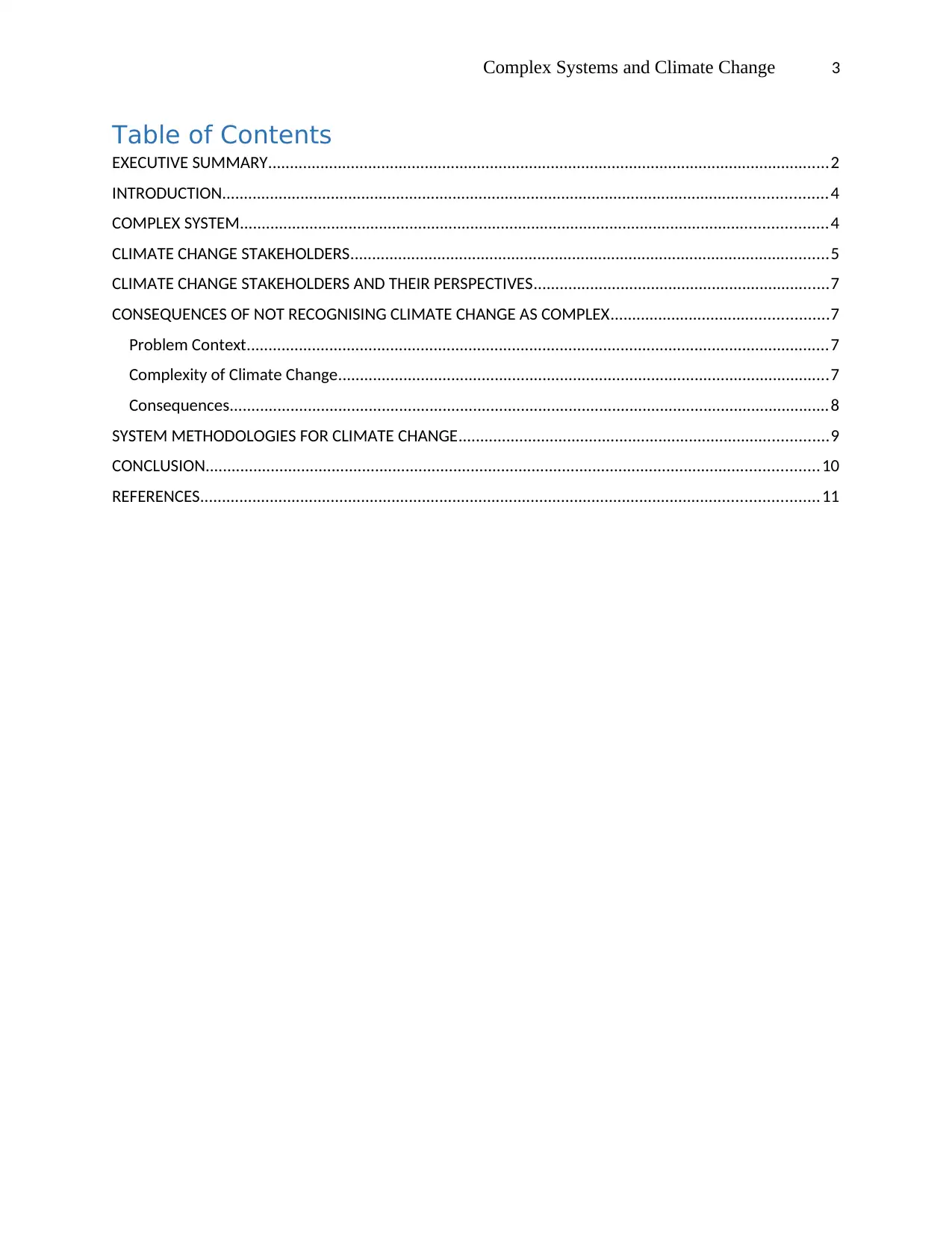
Complex Systems and Climate Change 3
Table of Contents
EXECUTIVE SUMMARY.................................................................................................................................2
INTRODUCTION...........................................................................................................................................4
COMPLEX SYSTEM.......................................................................................................................................4
CLIMATE CHANGE STAKEHOLDERS..............................................................................................................5
CLIMATE CHANGE STAKEHOLDERS AND THEIR PERSPECTIVES....................................................................7
CONSEQUENCES OF NOT RECOGNISING CLIMATE CHANGE AS COMPLEX..................................................7
Problem Context......................................................................................................................................7
Complexity of Climate Change.................................................................................................................7
Consequences..........................................................................................................................................8
SYSTEM METHODOLOGIES FOR CLIMATE CHANGE.....................................................................................9
CONCLUSION.............................................................................................................................................10
REFERENCES..............................................................................................................................................11
Table of Contents
EXECUTIVE SUMMARY.................................................................................................................................2
INTRODUCTION...........................................................................................................................................4
COMPLEX SYSTEM.......................................................................................................................................4
CLIMATE CHANGE STAKEHOLDERS..............................................................................................................5
CLIMATE CHANGE STAKEHOLDERS AND THEIR PERSPECTIVES....................................................................7
CONSEQUENCES OF NOT RECOGNISING CLIMATE CHANGE AS COMPLEX..................................................7
Problem Context......................................................................................................................................7
Complexity of Climate Change.................................................................................................................7
Consequences..........................................................................................................................................8
SYSTEM METHODOLOGIES FOR CLIMATE CHANGE.....................................................................................9
CONCLUSION.............................................................................................................................................10
REFERENCES..............................................................................................................................................11
⊘ This is a preview!⊘
Do you want full access?
Subscribe today to unlock all pages.

Trusted by 1+ million students worldwide
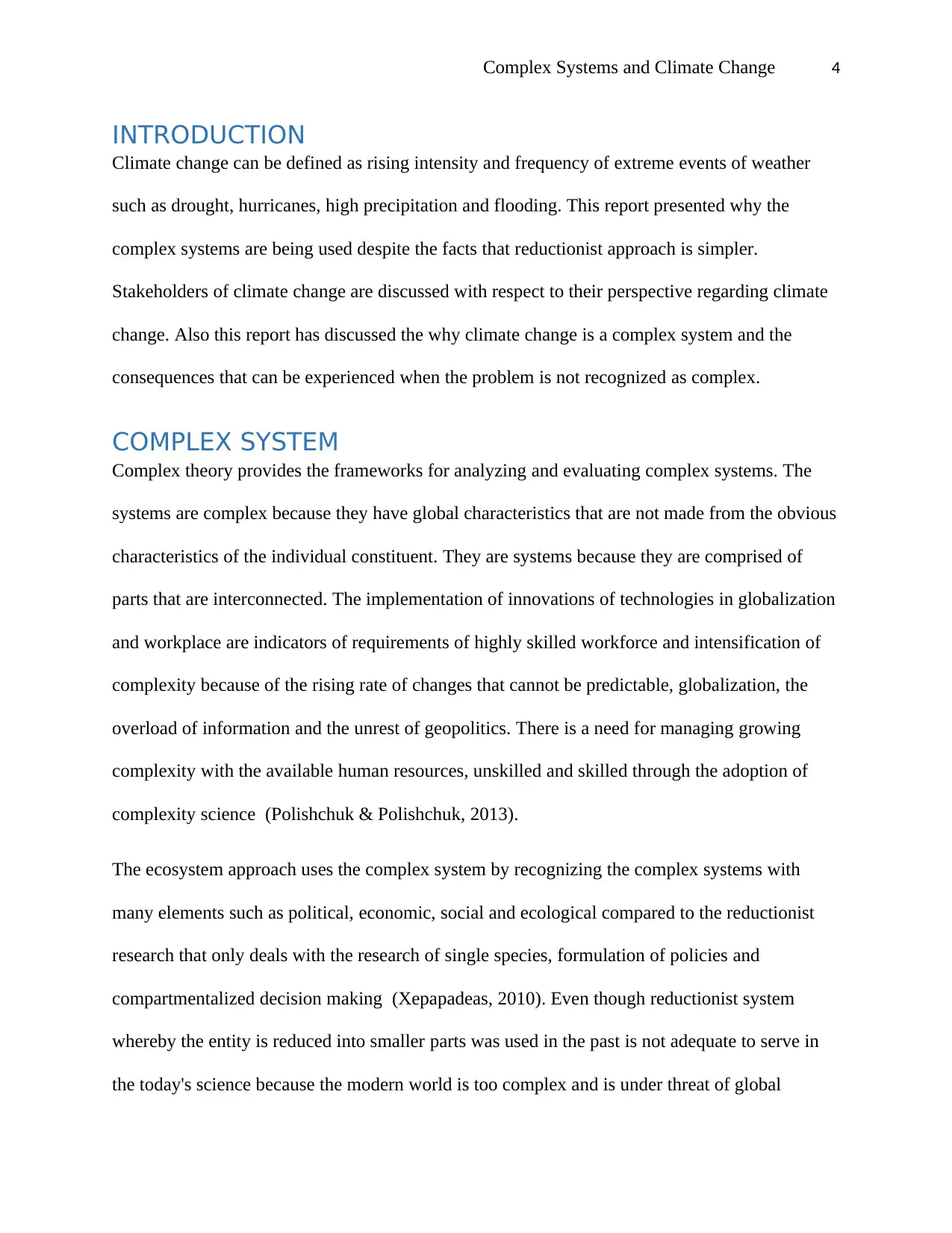
Complex Systems and Climate Change 4
INTRODUCTION
Climate change can be defined as rising intensity and frequency of extreme events of weather
such as drought, hurricanes, high precipitation and flooding. This report presented why the
complex systems are being used despite the facts that reductionist approach is simpler.
Stakeholders of climate change are discussed with respect to their perspective regarding climate
change. Also this report has discussed the why climate change is a complex system and the
consequences that can be experienced when the problem is not recognized as complex.
COMPLEX SYSTEM
Complex theory provides the frameworks for analyzing and evaluating complex systems. The
systems are complex because they have global characteristics that are not made from the obvious
characteristics of the individual constituent. They are systems because they are comprised of
parts that are interconnected. The implementation of innovations of technologies in globalization
and workplace are indicators of requirements of highly skilled workforce and intensification of
complexity because of the rising rate of changes that cannot be predictable, globalization, the
overload of information and the unrest of geopolitics. There is a need for managing growing
complexity with the available human resources, unskilled and skilled through the adoption of
complexity science (Polishchuk & Polishchuk, 2013).
The ecosystem approach uses the complex system by recognizing the complex systems with
many elements such as political, economic, social and ecological compared to the reductionist
research that only deals with the research of single species, formulation of policies and
compartmentalized decision making (Xepapadeas, 2010). Even though reductionist system
whereby the entity is reduced into smaller parts was used in the past is not adequate to serve in
the today's science because the modern world is too complex and is under threat of global
INTRODUCTION
Climate change can be defined as rising intensity and frequency of extreme events of weather
such as drought, hurricanes, high precipitation and flooding. This report presented why the
complex systems are being used despite the facts that reductionist approach is simpler.
Stakeholders of climate change are discussed with respect to their perspective regarding climate
change. Also this report has discussed the why climate change is a complex system and the
consequences that can be experienced when the problem is not recognized as complex.
COMPLEX SYSTEM
Complex theory provides the frameworks for analyzing and evaluating complex systems. The
systems are complex because they have global characteristics that are not made from the obvious
characteristics of the individual constituent. They are systems because they are comprised of
parts that are interconnected. The implementation of innovations of technologies in globalization
and workplace are indicators of requirements of highly skilled workforce and intensification of
complexity because of the rising rate of changes that cannot be predictable, globalization, the
overload of information and the unrest of geopolitics. There is a need for managing growing
complexity with the available human resources, unskilled and skilled through the adoption of
complexity science (Polishchuk & Polishchuk, 2013).
The ecosystem approach uses the complex system by recognizing the complex systems with
many elements such as political, economic, social and ecological compared to the reductionist
research that only deals with the research of single species, formulation of policies and
compartmentalized decision making (Xepapadeas, 2010). Even though reductionist system
whereby the entity is reduced into smaller parts was used in the past is not adequate to serve in
the today's science because the modern world is too complex and is under threat of global
Paraphrase This Document
Need a fresh take? Get an instant paraphrase of this document with our AI Paraphraser
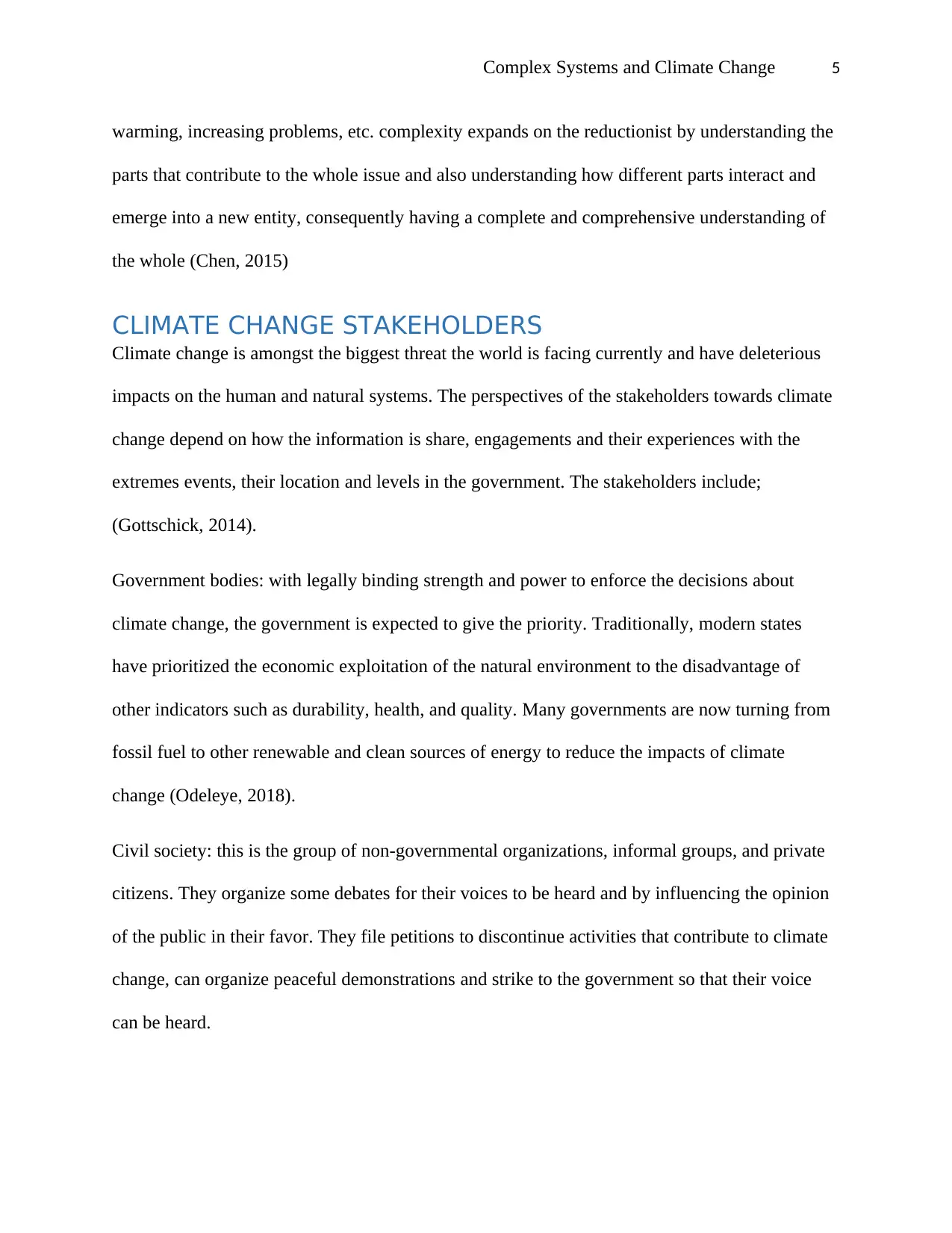
Complex Systems and Climate Change 5
warming, increasing problems, etc. complexity expands on the reductionist by understanding the
parts that contribute to the whole issue and also understanding how different parts interact and
emerge into a new entity, consequently having a complete and comprehensive understanding of
the whole (Chen, 2015)
CLIMATE CHANGE STAKEHOLDERS
Climate change is amongst the biggest threat the world is facing currently and have deleterious
impacts on the human and natural systems. The perspectives of the stakeholders towards climate
change depend on how the information is share, engagements and their experiences with the
extremes events, their location and levels in the government. The stakeholders include;
(Gottschick, 2014).
Government bodies: with legally binding strength and power to enforce the decisions about
climate change, the government is expected to give the priority. Traditionally, modern states
have prioritized the economic exploitation of the natural environment to the disadvantage of
other indicators such as durability, health, and quality. Many governments are now turning from
fossil fuel to other renewable and clean sources of energy to reduce the impacts of climate
change (Odeleye, 2018).
Civil society: this is the group of non-governmental organizations, informal groups, and private
citizens. They organize some debates for their voices to be heard and by influencing the opinion
of the public in their favor. They file petitions to discontinue activities that contribute to climate
change, can organize peaceful demonstrations and strike to the government so that their voice
can be heard.
warming, increasing problems, etc. complexity expands on the reductionist by understanding the
parts that contribute to the whole issue and also understanding how different parts interact and
emerge into a new entity, consequently having a complete and comprehensive understanding of
the whole (Chen, 2015)
CLIMATE CHANGE STAKEHOLDERS
Climate change is amongst the biggest threat the world is facing currently and have deleterious
impacts on the human and natural systems. The perspectives of the stakeholders towards climate
change depend on how the information is share, engagements and their experiences with the
extremes events, their location and levels in the government. The stakeholders include;
(Gottschick, 2014).
Government bodies: with legally binding strength and power to enforce the decisions about
climate change, the government is expected to give the priority. Traditionally, modern states
have prioritized the economic exploitation of the natural environment to the disadvantage of
other indicators such as durability, health, and quality. Many governments are now turning from
fossil fuel to other renewable and clean sources of energy to reduce the impacts of climate
change (Odeleye, 2018).
Civil society: this is the group of non-governmental organizations, informal groups, and private
citizens. They organize some debates for their voices to be heard and by influencing the opinion
of the public in their favor. They file petitions to discontinue activities that contribute to climate
change, can organize peaceful demonstrations and strike to the government so that their voice
can be heard.
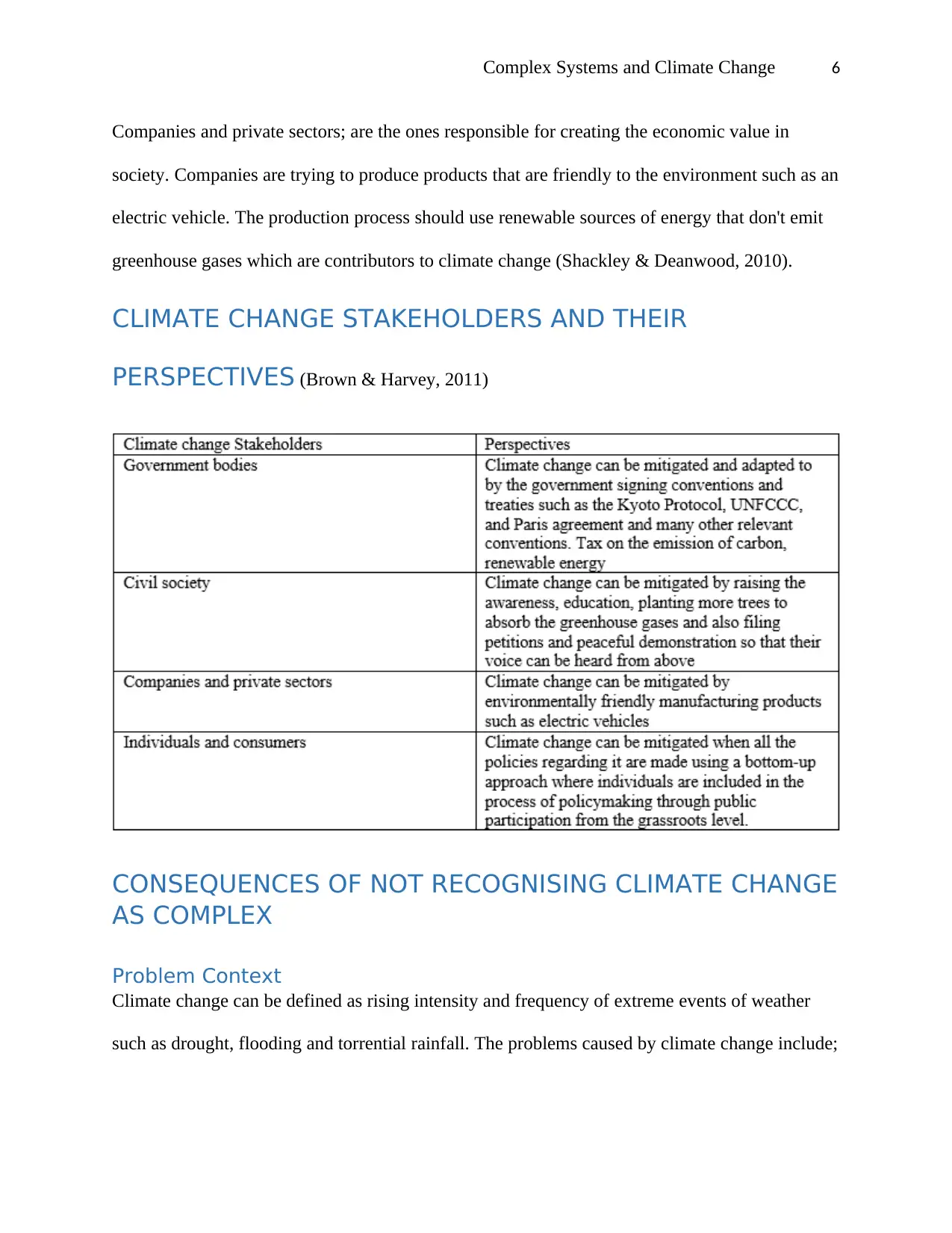
Complex Systems and Climate Change 6
Companies and private sectors; are the ones responsible for creating the economic value in
society. Companies are trying to produce products that are friendly to the environment such as an
electric vehicle. The production process should use renewable sources of energy that don't emit
greenhouse gases which are contributors to climate change (Shackley & Deanwood, 2010).
CLIMATE CHANGE STAKEHOLDERS AND THEIR
PERSPECTIVES (Brown & Harvey, 2011)
CONSEQUENCES OF NOT RECOGNISING CLIMATE CHANGE
AS COMPLEX
Problem Context
Climate change can be defined as rising intensity and frequency of extreme events of weather
such as drought, flooding and torrential rainfall. The problems caused by climate change include;
Companies and private sectors; are the ones responsible for creating the economic value in
society. Companies are trying to produce products that are friendly to the environment such as an
electric vehicle. The production process should use renewable sources of energy that don't emit
greenhouse gases which are contributors to climate change (Shackley & Deanwood, 2010).
CLIMATE CHANGE STAKEHOLDERS AND THEIR
PERSPECTIVES (Brown & Harvey, 2011)
CONSEQUENCES OF NOT RECOGNISING CLIMATE CHANGE
AS COMPLEX
Problem Context
Climate change can be defined as rising intensity and frequency of extreme events of weather
such as drought, flooding and torrential rainfall. The problems caused by climate change include;
⊘ This is a preview!⊘
Do you want full access?
Subscribe today to unlock all pages.

Trusted by 1+ million students worldwide
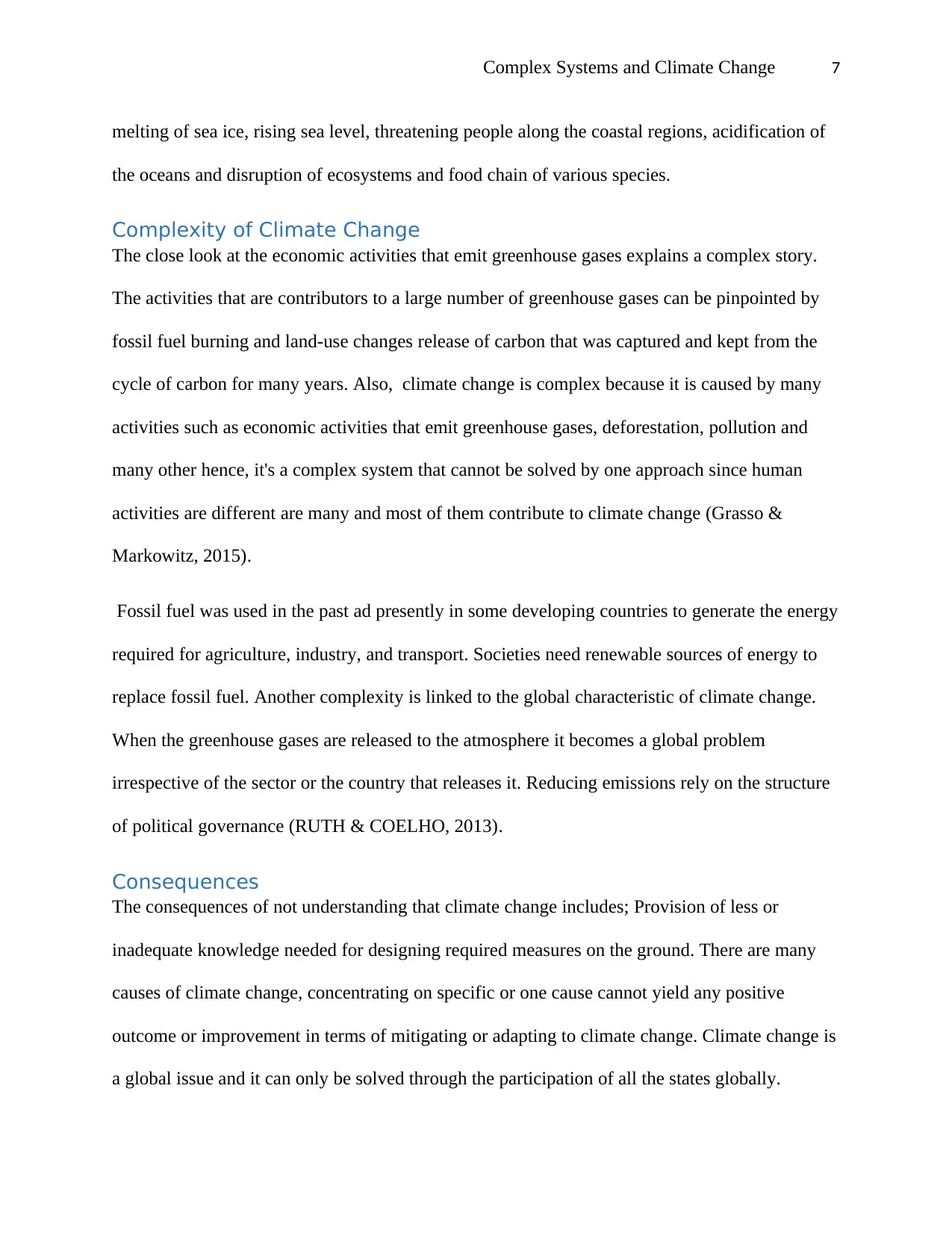
Complex Systems and Climate Change 7
melting of sea ice, rising sea level, threatening people along the coastal regions, acidification of
the oceans and disruption of ecosystems and food chain of various species.
Complexity of Climate Change
The close look at the economic activities that emit greenhouse gases explains a complex story.
The activities that are contributors to a large number of greenhouse gases can be pinpointed by
fossil fuel burning and land-use changes release of carbon that was captured and kept from the
cycle of carbon for many years. Also, climate change is complex because it is caused by many
activities such as economic activities that emit greenhouse gases, deforestation, pollution and
many other hence, it's a complex system that cannot be solved by one approach since human
activities are different are many and most of them contribute to climate change (Grasso &
Markowitz, 2015).
Fossil fuel was used in the past ad presently in some developing countries to generate the energy
required for agriculture, industry, and transport. Societies need renewable sources of energy to
replace fossil fuel. Another complexity is linked to the global characteristic of climate change.
When the greenhouse gases are released to the atmosphere it becomes a global problem
irrespective of the sector or the country that releases it. Reducing emissions rely on the structure
of political governance (RUTH & COELHO, 2013).
Consequences
The consequences of not understanding that climate change includes; Provision of less or
inadequate knowledge needed for designing required measures on the ground. There are many
causes of climate change, concentrating on specific or one cause cannot yield any positive
outcome or improvement in terms of mitigating or adapting to climate change. Climate change is
a global issue and it can only be solved through the participation of all the states globally.
melting of sea ice, rising sea level, threatening people along the coastal regions, acidification of
the oceans and disruption of ecosystems and food chain of various species.
Complexity of Climate Change
The close look at the economic activities that emit greenhouse gases explains a complex story.
The activities that are contributors to a large number of greenhouse gases can be pinpointed by
fossil fuel burning and land-use changes release of carbon that was captured and kept from the
cycle of carbon for many years. Also, climate change is complex because it is caused by many
activities such as economic activities that emit greenhouse gases, deforestation, pollution and
many other hence, it's a complex system that cannot be solved by one approach since human
activities are different are many and most of them contribute to climate change (Grasso &
Markowitz, 2015).
Fossil fuel was used in the past ad presently in some developing countries to generate the energy
required for agriculture, industry, and transport. Societies need renewable sources of energy to
replace fossil fuel. Another complexity is linked to the global characteristic of climate change.
When the greenhouse gases are released to the atmosphere it becomes a global problem
irrespective of the sector or the country that releases it. Reducing emissions rely on the structure
of political governance (RUTH & COELHO, 2013).
Consequences
The consequences of not understanding that climate change includes; Provision of less or
inadequate knowledge needed for designing required measures on the ground. There are many
causes of climate change, concentrating on specific or one cause cannot yield any positive
outcome or improvement in terms of mitigating or adapting to climate change. Climate change is
a global issue and it can only be solved through the participation of all the states globally.
Paraphrase This Document
Need a fresh take? Get an instant paraphrase of this document with our AI Paraphraser
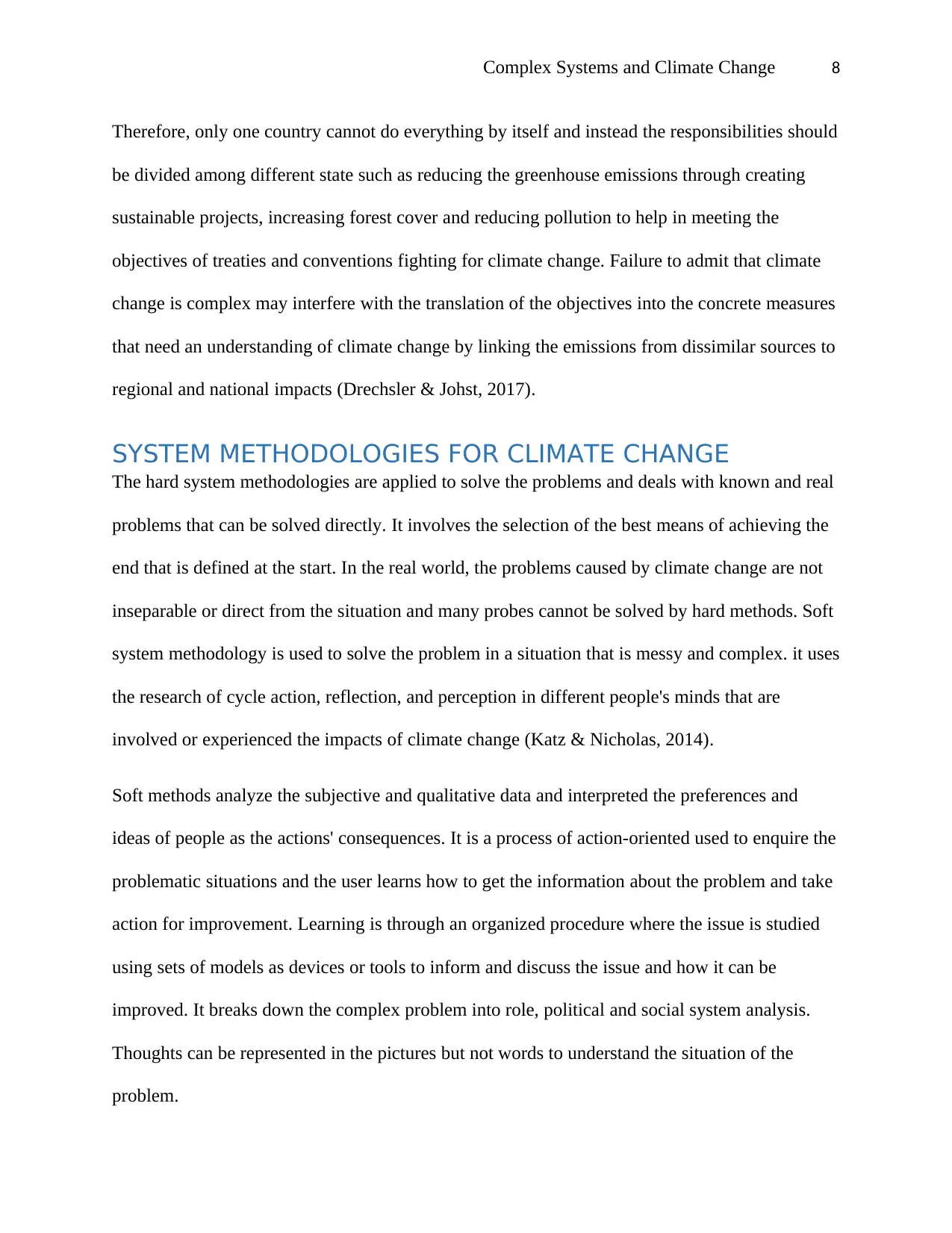
Complex Systems and Climate Change 8
Therefore, only one country cannot do everything by itself and instead the responsibilities should
be divided among different state such as reducing the greenhouse emissions through creating
sustainable projects, increasing forest cover and reducing pollution to help in meeting the
objectives of treaties and conventions fighting for climate change. Failure to admit that climate
change is complex may interfere with the translation of the objectives into the concrete measures
that need an understanding of climate change by linking the emissions from dissimilar sources to
regional and national impacts (Drechsler & Johst, 2017).
SYSTEM METHODOLOGIES FOR CLIMATE CHANGE
The hard system methodologies are applied to solve the problems and deals with known and real
problems that can be solved directly. It involves the selection of the best means of achieving the
end that is defined at the start. In the real world, the problems caused by climate change are not
inseparable or direct from the situation and many probes cannot be solved by hard methods. Soft
system methodology is used to solve the problem in a situation that is messy and complex. it uses
the research of cycle action, reflection, and perception in different people's minds that are
involved or experienced the impacts of climate change (Katz & Nicholas, 2014).
Soft methods analyze the subjective and qualitative data and interpreted the preferences and
ideas of people as the actions' consequences. It is a process of action-oriented used to enquire the
problematic situations and the user learns how to get the information about the problem and take
action for improvement. Learning is through an organized procedure where the issue is studied
using sets of models as devices or tools to inform and discuss the issue and how it can be
improved. It breaks down the complex problem into role, political and social system analysis.
Thoughts can be represented in the pictures but not words to understand the situation of the
problem.
Therefore, only one country cannot do everything by itself and instead the responsibilities should
be divided among different state such as reducing the greenhouse emissions through creating
sustainable projects, increasing forest cover and reducing pollution to help in meeting the
objectives of treaties and conventions fighting for climate change. Failure to admit that climate
change is complex may interfere with the translation of the objectives into the concrete measures
that need an understanding of climate change by linking the emissions from dissimilar sources to
regional and national impacts (Drechsler & Johst, 2017).
SYSTEM METHODOLOGIES FOR CLIMATE CHANGE
The hard system methodologies are applied to solve the problems and deals with known and real
problems that can be solved directly. It involves the selection of the best means of achieving the
end that is defined at the start. In the real world, the problems caused by climate change are not
inseparable or direct from the situation and many probes cannot be solved by hard methods. Soft
system methodology is used to solve the problem in a situation that is messy and complex. it uses
the research of cycle action, reflection, and perception in different people's minds that are
involved or experienced the impacts of climate change (Katz & Nicholas, 2014).
Soft methods analyze the subjective and qualitative data and interpreted the preferences and
ideas of people as the actions' consequences. It is a process of action-oriented used to enquire the
problematic situations and the user learns how to get the information about the problem and take
action for improvement. Learning is through an organized procedure where the issue is studied
using sets of models as devices or tools to inform and discuss the issue and how it can be
improved. It breaks down the complex problem into role, political and social system analysis.
Thoughts can be represented in the pictures but not words to understand the situation of the
problem.
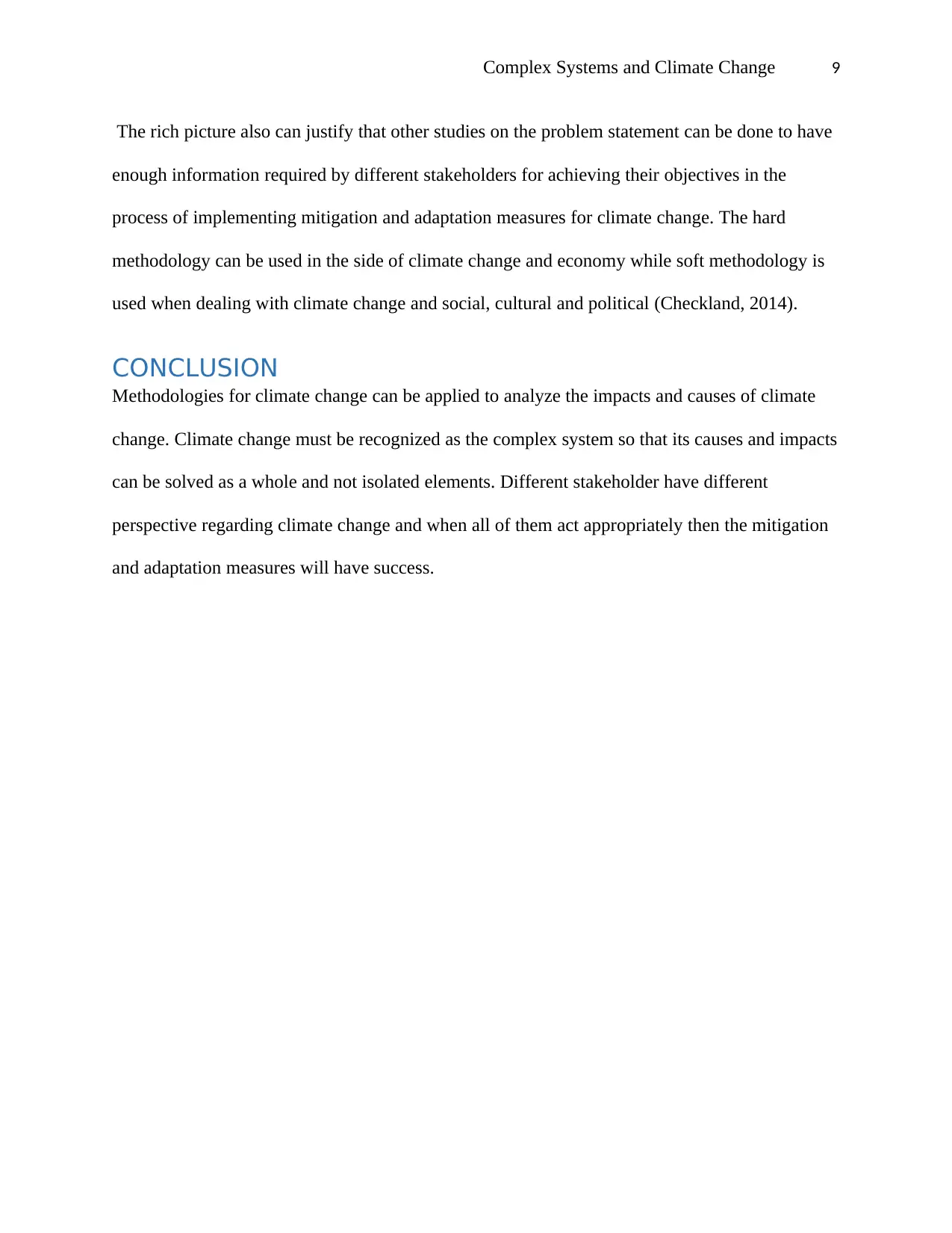
Complex Systems and Climate Change 9
The rich picture also can justify that other studies on the problem statement can be done to have
enough information required by different stakeholders for achieving their objectives in the
process of implementing mitigation and adaptation measures for climate change. The hard
methodology can be used in the side of climate change and economy while soft methodology is
used when dealing with climate change and social, cultural and political (Checkland, 2014).
CONCLUSION
Methodologies for climate change can be applied to analyze the impacts and causes of climate
change. Climate change must be recognized as the complex system so that its causes and impacts
can be solved as a whole and not isolated elements. Different stakeholder have different
perspective regarding climate change and when all of them act appropriately then the mitigation
and adaptation measures will have success.
The rich picture also can justify that other studies on the problem statement can be done to have
enough information required by different stakeholders for achieving their objectives in the
process of implementing mitigation and adaptation measures for climate change. The hard
methodology can be used in the side of climate change and economy while soft methodology is
used when dealing with climate change and social, cultural and political (Checkland, 2014).
CONCLUSION
Methodologies for climate change can be applied to analyze the impacts and causes of climate
change. Climate change must be recognized as the complex system so that its causes and impacts
can be solved as a whole and not isolated elements. Different stakeholder have different
perspective regarding climate change and when all of them act appropriately then the mitigation
and adaptation measures will have success.
⊘ This is a preview!⊘
Do you want full access?
Subscribe today to unlock all pages.

Trusted by 1+ million students worldwide
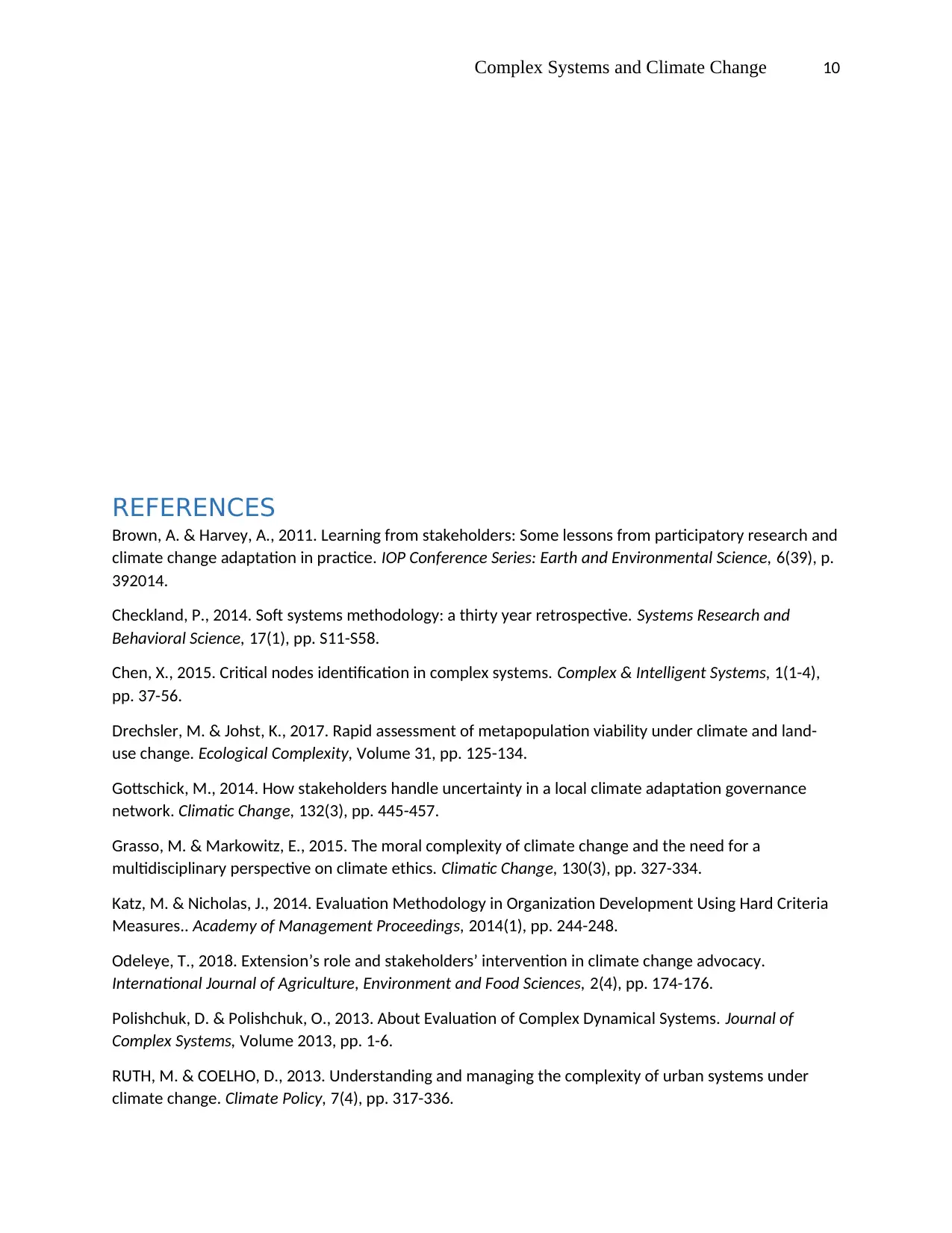
Complex Systems and Climate Change 10
REFERENCES
Brown, A. & Harvey, A., 2011. Learning from stakeholders: Some lessons from participatory research and
climate change adaptation in practice. IOP Conference Series: Earth and Environmental Science, 6(39), p.
392014.
Checkland, P., 2014. Soft systems methodology: a thirty year retrospective. Systems Research and
Behavioral Science, 17(1), pp. S11-S58.
Chen, X., 2015. Critical nodes identification in complex systems. Complex & Intelligent Systems, 1(1-4),
pp. 37-56.
Drechsler, M. & Johst, K., 2017. Rapid assessment of metapopulation viability under climate and land-
use change. Ecological Complexity, Volume 31, pp. 125-134.
Gottschick, M., 2014. How stakeholders handle uncertainty in a local climate adaptation governance
network. Climatic Change, 132(3), pp. 445-457.
Grasso, M. & Markowitz, E., 2015. The moral complexity of climate change and the need for a
multidisciplinary perspective on climate ethics. Climatic Change, 130(3), pp. 327-334.
Katz, M. & Nicholas, J., 2014. Evaluation Methodology in Organization Development Using Hard Criteria
Measures.. Academy of Management Proceedings, 2014(1), pp. 244-248.
Odeleye, T., 2018. Extension’s role and stakeholders’ intervention in climate change advocacy.
International Journal of Agriculture, Environment and Food Sciences, 2(4), pp. 174-176.
Polishchuk, D. & Polishchuk, O., 2013. About Evaluation of Complex Dynamical Systems. Journal of
Complex Systems, Volume 2013, pp. 1-6.
RUTH, M. & COELHO, D., 2013. Understanding and managing the complexity of urban systems under
climate change. Climate Policy, 7(4), pp. 317-336.
REFERENCES
Brown, A. & Harvey, A., 2011. Learning from stakeholders: Some lessons from participatory research and
climate change adaptation in practice. IOP Conference Series: Earth and Environmental Science, 6(39), p.
392014.
Checkland, P., 2014. Soft systems methodology: a thirty year retrospective. Systems Research and
Behavioral Science, 17(1), pp. S11-S58.
Chen, X., 2015. Critical nodes identification in complex systems. Complex & Intelligent Systems, 1(1-4),
pp. 37-56.
Drechsler, M. & Johst, K., 2017. Rapid assessment of metapopulation viability under climate and land-
use change. Ecological Complexity, Volume 31, pp. 125-134.
Gottschick, M., 2014. How stakeholders handle uncertainty in a local climate adaptation governance
network. Climatic Change, 132(3), pp. 445-457.
Grasso, M. & Markowitz, E., 2015. The moral complexity of climate change and the need for a
multidisciplinary perspective on climate ethics. Climatic Change, 130(3), pp. 327-334.
Katz, M. & Nicholas, J., 2014. Evaluation Methodology in Organization Development Using Hard Criteria
Measures.. Academy of Management Proceedings, 2014(1), pp. 244-248.
Odeleye, T., 2018. Extension’s role and stakeholders’ intervention in climate change advocacy.
International Journal of Agriculture, Environment and Food Sciences, 2(4), pp. 174-176.
Polishchuk, D. & Polishchuk, O., 2013. About Evaluation of Complex Dynamical Systems. Journal of
Complex Systems, Volume 2013, pp. 1-6.
RUTH, M. & COELHO, D., 2013. Understanding and managing the complexity of urban systems under
climate change. Climate Policy, 7(4), pp. 317-336.
Paraphrase This Document
Need a fresh take? Get an instant paraphrase of this document with our AI Paraphraser

Complex Systems and Climate Change 11
Shackley, S. & Deanwood, R., 2010. Constructing social futures for climate-change impacts and response
studies: building qualitative and quantitative scenarios with the participation of stakeholders. Climate
Research, Volume 24, pp. 71-90.
Xepapadeas, A., 2010. Modeling complex systems. Agricultural Economics, Volume 41, pp. 181-191.
Shackley, S. & Deanwood, R., 2010. Constructing social futures for climate-change impacts and response
studies: building qualitative and quantitative scenarios with the participation of stakeholders. Climate
Research, Volume 24, pp. 71-90.
Xepapadeas, A., 2010. Modeling complex systems. Agricultural Economics, Volume 41, pp. 181-191.
1 out of 11
Related Documents
Your All-in-One AI-Powered Toolkit for Academic Success.
+13062052269
info@desklib.com
Available 24*7 on WhatsApp / Email
![[object Object]](/_next/static/media/star-bottom.7253800d.svg)
Unlock your academic potential
Copyright © 2020–2026 A2Z Services. All Rights Reserved. Developed and managed by ZUCOL.





